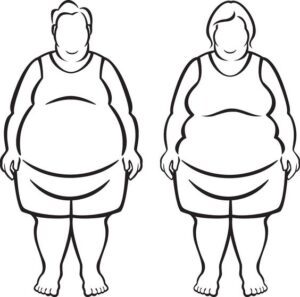Have you ever been mocked because of your weight or called an obese? A high number of population all around the world is facing the disease called obesity.
From a young age, many individuals are consistently told to lose weight to become healthy or look pretty.
They are shamed for being lazy, are advised to develop a habit of physical sports, and are even stopped from eating an average amount of food to reduce calorie intake.
Moreover, when we visit doctors for health issues- whether or not it is related to our disease- we are still advised to reduce weight. How often have we been introduced to the idea of using Ozempic for weight loss by our doctors?
Whether these advices come from a place of sincerity or an attempt to ridicule us, the one thing remains consistent; lack of education.
This article will discuss the intricate details of why it is challenging for some individuals to lose weight or deal with obesity.
Link Between Childhood Trauma And Obesity
Obesity is a global epidemic. Many countries continue to state high statistics of obese or overweight individuals. While it is easy to correlate our unhealthy lifestyles and eating habits to high stats of obesity, there is an underlying cause of such patterns to be developed in the first place.
Individuals who suffer through a traumatic event tend to find ways to comfort themselves. Adults often see it as drinking alcohol, meaningless sex, or partying.

But when facing childhood trauma, it becomes food. You tend to receive a lack of care and comfort from your parents from good food that instantly boosts your mood.
In the long run, this temporary comfort turns into food addiction which is often classified as a symptom of childhood trauma in adulthood.
Food addiction makes it difficult to avoid eating food despite feeling full or satisfied. It is less about whether you are hungry and more about keeping yourself occupied, avoiding boredom, or providing consistent care.
Moreover, we tend to shame and blame children for their growing weight. While their weight gain might result from a developing body or hormones, we blame them for eating too much or not being active.
As a result, the child will start harboring hatred towards themselves. They will feel isolated, ashamed, and out of control.
They may restrict their eating habits or exercise more frequently than required. This response causes them to develop an unhealthy relationship with food, where they are constantly either overeating or starving, with no balance.
Obesity- Using Food For Comfort
Adverse childhood experiences can have many classifications. Whether it is abuse, poverty, loss, emotional detachment from parents, or an unstable living environment, all of them are explored when diagnosing through a childhood trauma questionnaire.
When a child experiences such trauma, their body starts working in fight, flight, or freeze mode. Fight means they resist their situation; flight means they run away from it; and freeze is when they are incapable of responding.
These responses are an attempt for a child to protect themselves from the adverse experience.
In an ideal situation, a caretaker would comfort the child after the crisis has passed. However, in some instances where the child receives no comfort from parents, they tend to find their ways of comfort.
Overeating
Overeating is one of those comforting coping mechanisms. It serves as a distraction from what is occurring around you.
Moreover, childhood trauma increases the risk of an individual developing mental health disorders such as depression, anxiety, personality disorders, etc.
When we observe symptoms of childhood trauma in adulthood, we often discover adults using food as a coping mechanism and distraction from life stressors, relationship problems, financial issues, or even fatigue.
Why Addressing Trauma Is Important For Weight Loss?
Trauma-informed practice includes looking into underlying causes of obesity. When discussing food as a means of comfort, distraction, or addiction, it is essential to tackle that issue and find a replacement before focusing on weight loss.
Individuals using food for comfort are likely to fail their diets and break healthy eating habits because the minute they are stressed, they will fall back into their unhealthy pattern to find comfort.
Methods of Self Comfort
However, let’s help them find other methods of self-comfort, such as changing of environment, listening to calming music, deep breathing, or exercising. They are less likely to break the habit of healthy eating.
Many trauma-informed doctors working with patients suffering from obesity utilize childhood trauma questionnaires to eradicate the root cause of the problem.
They help individuals overcome their trauma and their unhealthy coping mechanisms. They help them develop positive behaviors and promote self-love.
Weight Loss
Then they continue to help them focus on their health through calorie deficit, exercises, or using Ozempic for weight loss.
The medicine is effective in assisting individuals to get the kick-start they require and promoting internal health to encourage weight loss.

Benefiting From Understanding Trauma And Weight Loss
The most apparent benefit of understanding trauma and obesity is;
- It helps doctors fully understand the problem and work from eradicating the root cause to developing healthy eating habits.
- It helps individuals recognize the difference between actual hunger and emotional eating.
- It also helps individuals face their trauma to overcome other unhealthy coping mechanisms they may have developed due to childhood trauma.
- Once the trauma is addressed, the weight loss is shed for good. There is little to no chance of gaining weight again since the problem of emotional or comfort eating is solved.
- You become a part of the community suffering from similar issues. This community helps you stay accountable for your recovery and help others.
- Your relationship with food heals.
Obesity- Stay On Track Of Recovery
Whenever you feel as if your negative emotions are triggering your unhealthy eating habits, take steps to prevent relapse.
Here’s how;
Keep A Food Diary
It will be pretty helpful to note down your eating habits, including how much you eat, when, and your feelings during eating. This will help you recognize eating patterns that might be emotional and can be eradicated.
Implement Stress Reduction Techniques
Stress management can help you stay on track. Deep breathing, yoga, or journaling are excellent ways to reduce stress.
Have A Hunger Reality Check
Ask yourself whether you are hungry or eating emotionally. It is unlikely for an individual to feel hungry an hour after having a full meal but not unlikely for an individual to want to eat to pass boredom or gain comfort.
If you are not hungry, give your craving time to pass and distract yourself with other hobbies.
Don’t Deprive Yourself
Weight loss does not mean you have to under eat considerably low or cannot have junk/comfort food.
Focus on the 70/30 rule. 70% of the time, ensure you are eating healthy, and 30% of the time, enjoy whatever food you want. By restricting your body, you are essentially making it crave junk/comfort food more which can lead to more relapses.
Learn From Setbacks
If you relapse and end up eating emotionally, don’t hold it against yourself. Forgive yourself and learn from your mistakes.
Develop a prevention plan, and keep sight of your progress. Relapses are common, but getting back on track will help you recover.
Conclusion
Recovery varies for every individual. It is not linear and differs from person to person. Do not hold yourself up to an impossible standard; instead, love yourself through the ultimate journey of betterment.


